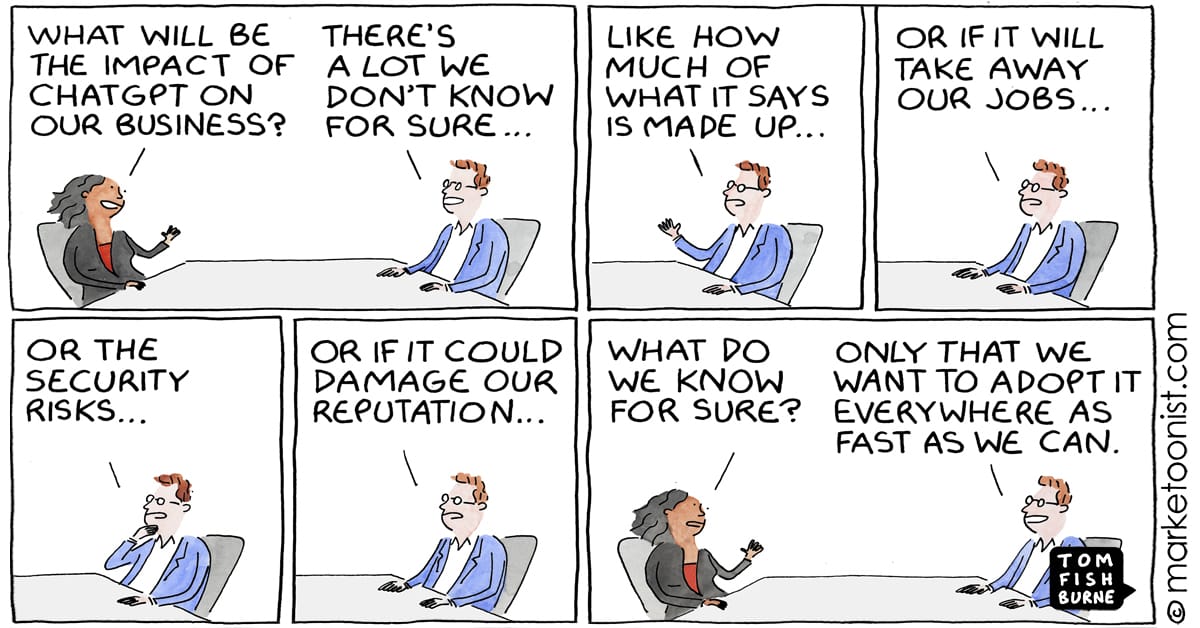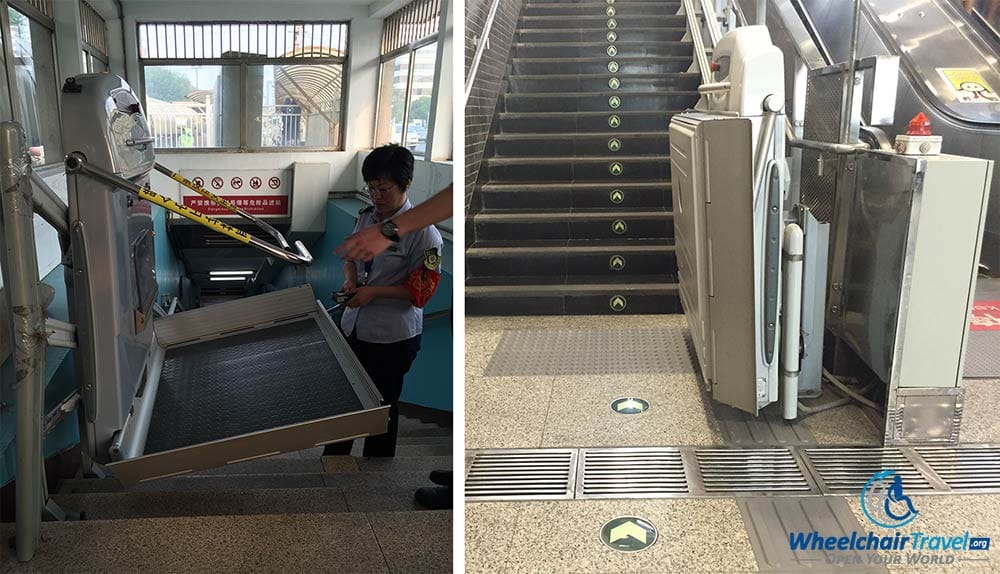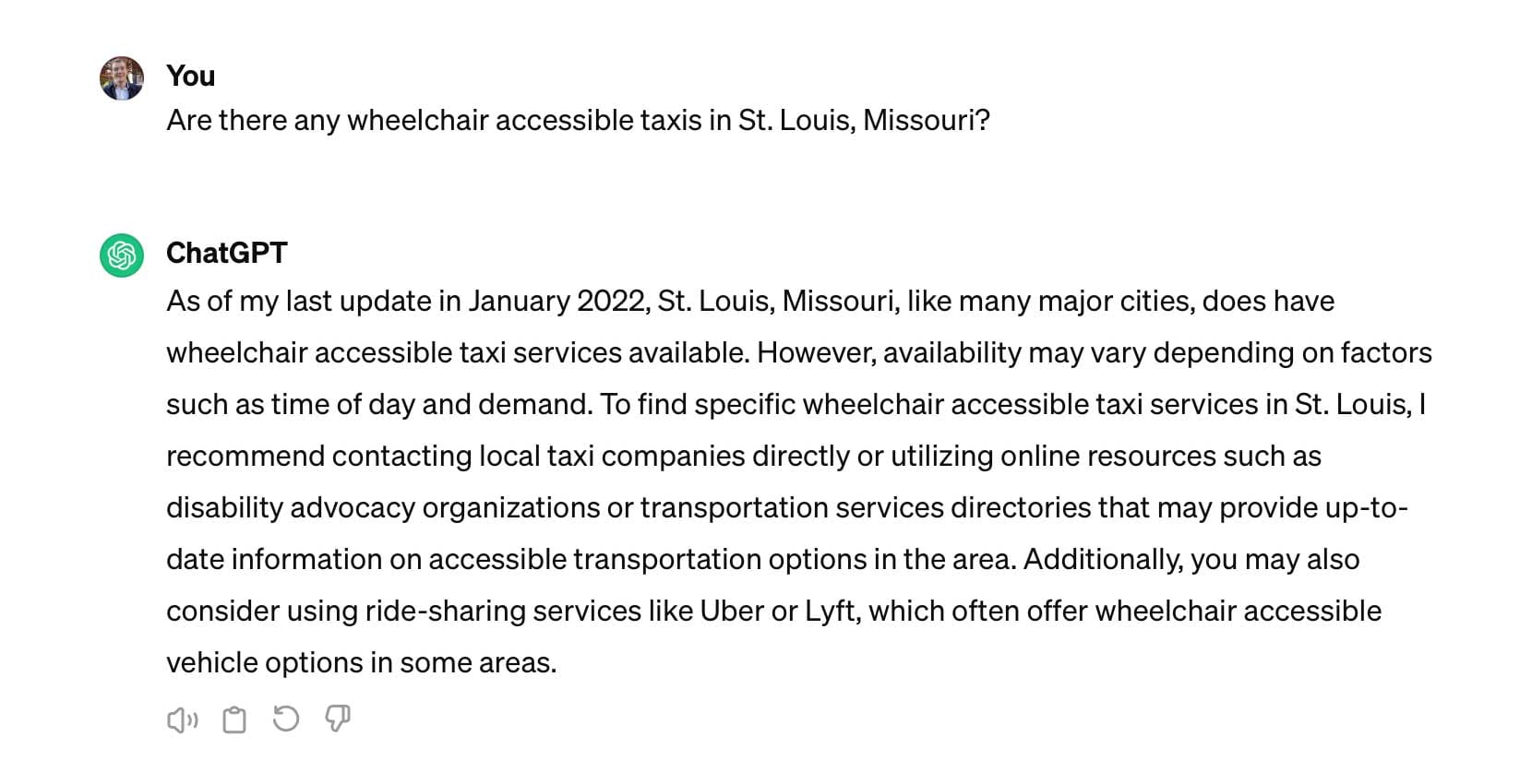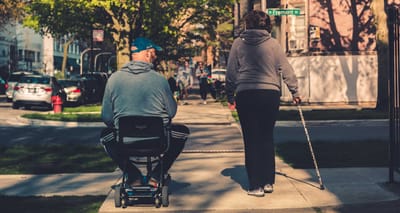WheelchairTravel.org is an AI-free zone.
Famous last words? I think not. The promise of artificial intelligence is not something to scoff at, but it is not yet ready for primetime — at least not with respect to accessible travel. Websites like this one, where people come for trusted, verified information about accessibility in travel, are not yet the place to experiment with technology that defaults to “trust” and does not verify.

Large language models (LLMs) like OpenAI’s ChatGPT spit out information lifted from books, research papers, media publications, and websites like this one, all while commingling that data with information gleaned from much less reliable sources. With each update, AI models will increasingly rely on AI-generated content as truth, rather than as the inconsistent gobbledygook it so often is.
As a brief aside, questions about the legality of OpenAI’s methods are rampant, with The New York Times suing the firm for alleged copyright infringement. I too am concerned about the use of information from WheelchairTravel.org, particularly when it is displayed alongside information from inaccurate sources that may lead disabled travelers astray. While this website is a small fish in the very large pond of the World Wide Web, I encourage big fish like The Times to ask the relevant questions that are important to us all.
Shocker: Most of the human-generated content about accessible travel is false
In one of the earliest blog posts to appear on this website, I wrote about the importance of reclaiming the disability community’s travel voice. It was true then, and still is now, that much of the content written about accessible travel is produced not by disabled travelers with lived experience, but by nondisabled people, marketing professionals and journalists.

Following trips to Beijing, China in 2014, and to Moscow, Russia in 2015 — two of the most challenging destinations that I have visited — I remarked on the wild extremes nondisabled people used to describe accessibility. One author wrote that Beijing’s transit system was “fully accessible,” a term that should raise a red flag anytime it appears, while another referred to Moscow as “completely inaccessible.” Neither are true, and inaccuracies in information may lead disabled readers to make poorly informed decisions based on this type of bogus reporting.
Content published by nondisabled people is problematic enough, but the greater danger lies in the prevalence of outdated or inaccurate information. We assume that, once an investment in accessibility has been made, it will remain forever. But like the crumbling bridges spread all across America or the broken wheelchair lifts on the Beijing subway, accessible infrastructure, features and services do not always withstand the test of time.
Just this week, I visited the City of St. Louis, Missouri — the local government’s website boasts about the numerous providers of wheelchair accessible taxis here. The problem is, that information is at least 12 years old and there have been no wheelchair taxis in St. Louis for a decade. If a “trusted source” like City Hall is peddling misinformation about accessibility, it’s no wonder that ChatGPT would parrot those inaccuracies:

In querying ChatGPT about accessible taxis in St. Louis, the model assured me that St. Louis “does have wheelchair accessible taxi services available.” It also recommended rideshare services like Uber or Lyft, but St. Louis is not one of the 17 Cities with Wheelchair Accessible Uber or Lyft. I hope you won’t trust ChatGPT with your travel planning!
Alarmingly, an increasing amount of accessible travel content is being written by artificial intelligence software. Unscrupulous businesses are using LLMs like ChatGPT to populate their websites with content, seeking out clicks and paying no mind to the quality of what they are publishing. Many businesses in the disability space, including adapted van dealers and mobility equipment suppliers, are engaged in this activity — publishing AI-generated accessible travel stories that bear little relationship to reality. They don’t care about accessible travel, and simply want to sell you a van, wheelchair or Hoyer lift, and will happily throw a wrench into your travel planning in exchange for a click.
“Habsburg AI” is going to become a problem
We are not long off from reaching a tipping point — soon, the majority of web content will be AI generated. In May 2023, The Guardian reported that misinformation tracking organization NewsGuard had identified at least 50 news websites publishing content that was completely AI-generated. Outlandish claims might be easily cast aside or fact-checked by readers, but false content about seemingly unimportant topics may fool even the most eagle-eyed observers.
We’ve seen how ChatGPT can pull outdated information from online sources, like in the case of St. Louis taxis, but what happens when LLMs incorporate false content generated by competing AI models in their own databases?
Researcher Jathan Sadowski broached this topic on his Machine Kills Podcast, arguing that the utility of LLMs collapses when they are trained on false information produced by other generative AI models. “Habsburg AI,” he calls it, in reference to the collapse of the Habsburg dynasty due to inbreeding.
Ilia Shumailov, speaking about research conducted with a UK and Canada research team, told VentureBeat that “over time, mistakes in generated data compound and ultimately force models that learn from generated data to misperceive reality even further.” The feedback loop leads AI models to move further from reality over time, forgetting the human-generated data that they were originally trained on.
Large amounts of inaccurate or outdated accessible travel information produced by humans has been used to train AI models that now provide recommendations devoid of facts. LLMs could prove useful when trained on a limited set of human-verified data (perhaps at the city or state level), but use of a global model with limited quality control could prove dangerous for disabled travelers who require accurate guidance on accessibility. At best, filtering the accessible travel information generated by ChatGPT for morsels of truth will be time-consuming, and at worst it will be accepted at face value, potentially leading to serious consequences when the AI’s accepted truth does not align with reality.
You might end up stranded overnight at the St. Louis Airport! Thankfully, the terminal building is open 24 hours a day.
Where can Artificial Intelligence make a difference in accessible travel?
ChatGPT is a global large language model that has been trained on and has access to a seemingly endless supply of information. Those models aren’t going to be particularly good at rendering accessible travel information, at least not without further development and innovation.
One alternative, as mentioned earlier, is to train AI models on a limited set of information — These siloed tools could then become experts on particular topics in accessible travel. Companies have been using similar technologies in chat bots for years, designed to generate responses from a limited library of relevant data to perform customer service functions. The same could be true for an accessible travel database, one that will be curated to include only the best and most reliable information from the world of accessible travel. Such a tool is likely a way off, given the scope of information that would need to be assembled and the cost of doing so.
Other technologies, commonly referred to as AI, but which are more properly understood as smart technologies trained for a specific function, could make a meaningful impact more quickly.
Here are a few innovative technologies that could soon make a very big difference for disabled travelers:
- Smart traffic signals — If a mobility-challenged person (or a wheelchair user) is in the crosswalk at a busy intersection, why don’t stoplights give them extra time to cross? A British company, Now Wireless, has developed a system that uses wide-angle cameras and AI-powered software to do just that. In the words of CEO Brian Jackson, as reported by Transport Network, the focus is on “giving priority when needed and more fairly than traditional systems allow.” If you’re interested in this topic, read about other ways to make streets and sidewalks safer for wheelchair users.
- Automated driving systems — It seems wheelchair accessible self-driving taxis may be just around the corner. By eliminating the human cost of operating an ADA accessible taxi, adapted vehicles could become much more common, if not universal, in taxi and rental car fleets. Beyond motor vehicles, some airports have tested autonomous wheelchairs to help disabled passengers navigate the terminal.
- Communication apps — Many great mobile applications already exist to help travelers communicate when traveling, however AI can extend the functionality of services like Google Translate to include other languages like sign language. Could the Universal Translator from Star Trek soon become a reality?
- Navigational apps — Wayfinding apps like GoodMaps provide indoor navigational assistance not only to blind or low vision people, but also to others who appreciate guidance and certainty in unfamiliar environments. This video from GoodMaps and the Portland International Airport demonstrates the multiple use cases.
These solutions have already arrived, and there is surely much greater and still undiscovered opportunity for AI to make an impact on accessible travel planning. Trustworthy solutions will be those based on fact-checked information that is frequently updated and, where possible, real-time data.
Final Thoughts
The excitement around the seemingly limitless potential of artificial intelligence to impact our lives is understandable, but in the world of accessible travel, where accuracy is imperative to the customer experience, the industry cannot afford to launch half-baked tools that leave disabled travelers in the lurch. Accuracy and reliability are table stakes for engaging with this market in a meaningful way. Misleading disabled travelers won’t end well for many business owners and developers, but it may be where the journey of AI-“enhanced” accessible travel products begins. Buyer beware, at least in these early days.















